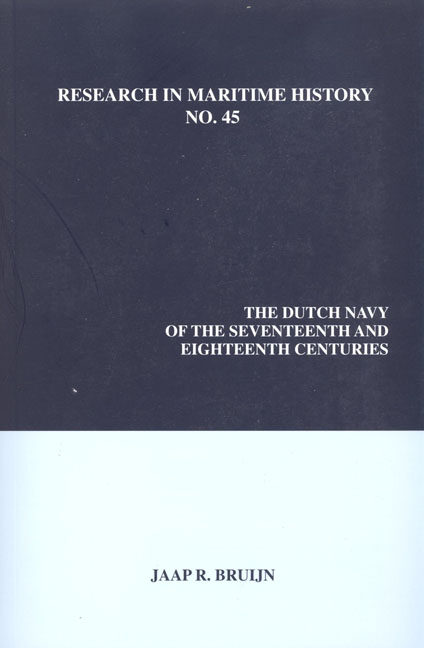Book contents
- Frontmatter
- Contents
- Illustrations
- Tables
- Series Editor's Foreword
- About the Author
- Introduction to the 2011 Edition
- Foreword
- Preface
- Introduction
- Map of the Dutch Republic
- Map of Dutch Naval Activity in European Waters
- Part One The “Old” Navy, Late 1500s-1652
- Part Two The “New” Navy, 1652-1713
- Part Three A Second-Rate Navy, 1714-1795
- Convoys and the Containment of the Barbary Corsairs
- Favouritism and Innovation
- Little Work, But More Education for the Naval Officer
- Naval Seaman, A Poor Man's Job
- Aftermath
- In Retrospect
- Bibliography
- Index
Naval Seaman, A Poor Man's Job
from Part Three - A Second-Rate Navy, 1714-1795
- Frontmatter
- Contents
- Illustrations
- Tables
- Series Editor's Foreword
- About the Author
- Introduction to the 2011 Edition
- Foreword
- Preface
- Introduction
- Map of the Dutch Republic
- Map of Dutch Naval Activity in European Waters
- Part One The “Old” Navy, Late 1500s-1652
- Part Two The “New” Navy, 1652-1713
- Part Three A Second-Rate Navy, 1714-1795
- Convoys and the Containment of the Barbary Corsairs
- Favouritism and Innovation
- Little Work, But More Education for the Naval Officer
- Naval Seaman, A Poor Man's Job
- Aftermath
- In Retrospect
- Bibliography
- Index
Summary
During many previous periods, the navy was able to provide its men with regular employment. Many thousands had on the annual payroll during the great wars, but those days ended with the War of the Spanish Succession. Now, no more than a few thousand seamen annually were required to carry on the typical peacetime pattern of naval activities, although occasionally the international situation demanded the fitting out of more ships. The admiralty at Amsterdam was responsible for three-quarters of all vessels, mainly the lowest rated ships-of-the-line and frigates. No problems in recruiting the comparatively few seamen needed were anticipated. But, in fact, the task of adequately manning the ships was soon to prove difficult. By 1725, there were already too few petty officers available, a shortage leading the admiralty at Amsterdam to increase their pay to encourage enlistments.
In 1731, Captain Schrijver suddenly fulminated against the general lack of experience in the armed forces and declared that there was a shortage of both seamen and soldiers. In April of that year, he had had difficulty in manning two ships of war. Though ultimately he was able to secure the full quota of men, their lack of shipboard know-how delayed sailing and led to accidents. Once at sea, many of the men - far more than usual - were laid low for a long time by seasickness. Although Dutch warships had always operated in South European waters, almost half of Schrijver's crew had never before passed the Berlingas, the small island off the coast near Lisbon where seamen usually underwent their initiation as full-fledged sailors. Later, in the Mediterranean roadstead of Málaga, it became clear that only a few were capable of even rowing a boat in calm water. But Schrijver's observation that the navy's standards were declining from year to year was not taken seriously by the Amsterdam board of admiralty.
The board decided to attach sailors, particularly petty officers, more permanently to the admiralty than it had previously done. Those who had made at least two voyages in a warship and could furnish a certificate from their captains testifying to their good conduct and fitness for their duties were given priority from then on.
- Type
- Chapter
- Information
- The Dutch Navy of the Seventeenth and Eighteenth Centuries , pp. 170 - 186Publisher: Liverpool University PressPrint publication year: 2011



